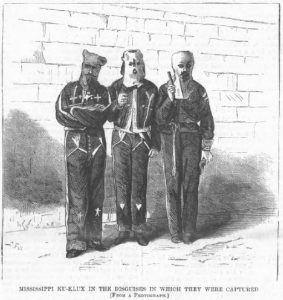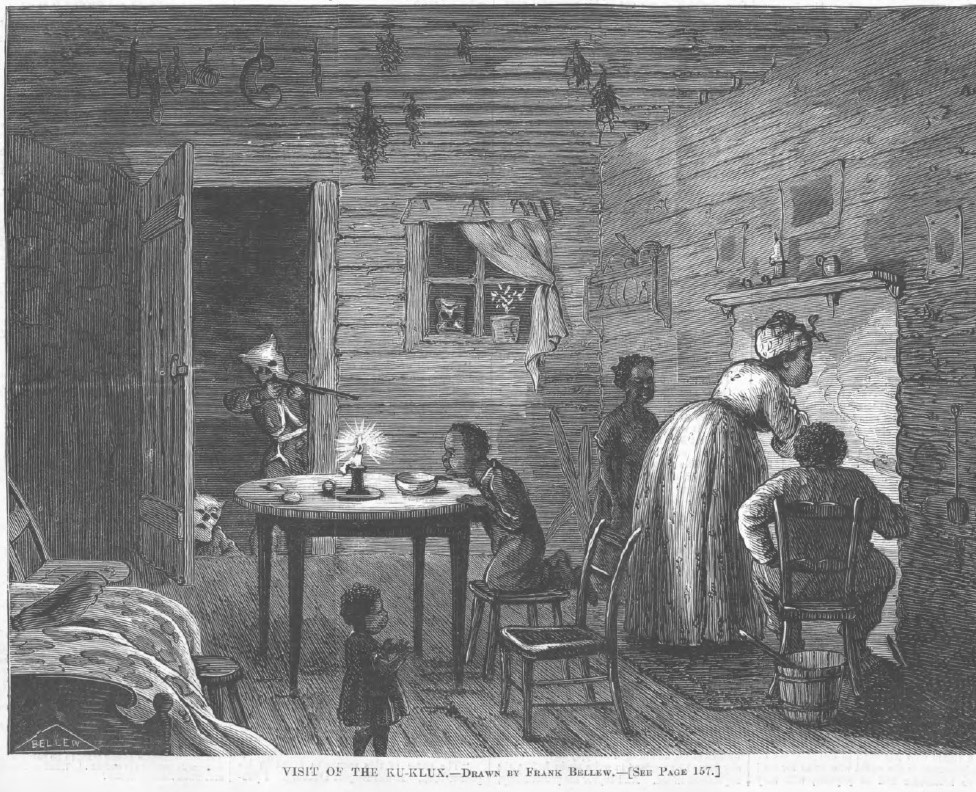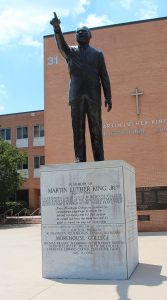From the January 27, 1872 issue of Harper’s Weekly:
THE KU-KLUX.
WE give on this page an illustration, engraved from a photograph from life, showing three members of a band of Mississippi Ku-Klux, who are now under indictment in that State for the attempted murder of a family by the name of HUNICUTT. These men were captured last September in Tishamingo [sic] County, Mississippi, by G.W. WELLS, United States Attorney for the Northern District of that State, assisted by United States Marshal J.H. PIERCE, and his deputy, JOHN M’COY. The illustration is doubly interesting as showing the disguises actually worn by these miscreants. They are not, however, always so elaborate in their brigand toilet. A white blanket or sheet thrown over the head, with holes for the eyes, is usually sufficient.
It is gratifying to know that the government is putting forth efficient exertions to bring to justice these miscreants in every part of the South troubled by their presence. While there is evidence that the better portion of the Southern people discountenance the outrages committed by the Ku-Klux bands, it is no less evident that nothing short of the most energetic and summary measures on the part of the general government can bring them to an end, and give protection to peaceful citizens, black and white. The outrages committed in Kentucky, Mississippi, and the Carolinas by these brigands are too notorious for denial. In the recent trials at Columbia, South Carolina, one of the counsel for the prisoners, the Hon. REVERDY Johnson, felt compelled by the evidence to use this extraordinary language toward his own clients:
“Neither my distinguished friend Mr. STANBERY nor myself are here to defend, or justify, or palliate any outrages that may have been perpetrated in your State by the association of Ku-Klux. I have listened with horror to some of the testimony which has been brought before you. The outrages proved have been shocking to humanity; they admit neither of justification nor excuse; they violate every obligation which law and nature impose upon men. These men appear to have been alike insensible to the obligations of humanity and religion; but the day will come, however, if it has not already arrived, when they will deeply lament it. Even if justice should not overtake them, there is another tribunal from which there is no escape. It is their own conscience, that tribunal which sits in the breast of every living man, that still small voice that thrills through the heart, and as it speaks gives happiness or torture — the voice of conscience — the voice of God.”
Had this language come from the lips of a “Federal judge” or a “military satrap,” it might have been characterized as exaggerated, or suspected of violent partisanship; but forced by irresistible evidence from the lips of the prisoners’ own counsel, it must be accepted as conclusive testimony to the truth of the charges against these lawless disturbers of the South.
Recent intelligence from Kentucky shows that the government can not be too prompt and energetic in its measures of protection. On the night of the 2d inst. a band of twenty Ku-Klux made a raid upon some negroes near Frankfort, in that State, whipping one of them and ordering the others to leave the neighborhood on pain of death. One farmer was warned to employ none but white laborers. It is the declared purpose of these outlaws to drive the negroes from the county. But the day is past when such threats can be carried out. These outlaws will speedily be taught that the government will protect peaceable citizens in the full enjoyment of their rights, life, and property, if it takes the whole military power of the nation to do it.
From the same newspaper’s February 24, 1872 issue:
THE artist, on page 160, pictures an outrage of frequent occurrence in some of the most turbulent districts of the Southern States. The scene is the interior of a negro cabin, where the little family – fearing no evil — is gathered after the work of the day is over. Suddenly the door is opened, and a member of the Ku-Klux Klan appears, with gun in hand, to take the life of the harmless old man who sits at the fire-place, and whose only “crime” is his color. It is to be hoped that under a rigorous administration of the laws these deeds of violence will soon cease forever.
In its January 20, 1872 issue Harper’s Weekly reported a riot in Rochester, New York:
DOMESTIC INTELLIGENCE.
…
There was serious trouble recently at Rochester, New York. A negro named Howard brutally outraged a white child ten years old. Upon being arrested he was threatened with Lynch Law by an excited crowd, by whom the jail in which he was confined was attacked. It was defended by a military force, who were compelled to fire upon the rioters, several of whom were killed. The negro was subsequently tried secretly, and on pleading guilty, he was sentenced to twenty years’ imprisonment in the Auburn State-Prison, whither he was immediately conveyed.
You can read all of Martin Luther King Jr.’s August 28, 1963 “I Have a Dream” speech at NPR. Here are a couple paragraphs:
I have a dream that one day even the state of Mississippi, a state sweltering with the heat of injustice, sweltering with the heat of oppression will be transformed into an oasis of freedom and justice.
I have a dream that my four little children will one day live in a nation where they will not be judged by the color of their skin but by the content of their character. I have a dream today.




